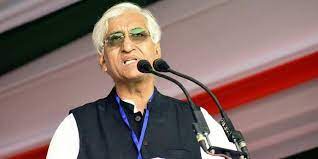


n a significant pre-election manoeuvre, the Indian National Congress has appointed TS Singh Deo as Deputy Chief Minister of Chhattisgarh. As five states, including Madhya Pradesh, Chhattisgarh, Mizoram, Rajasthan, and Telangana gear up for their upcoming elections, this significant political move by Congress is under the spotlight.
In the 2018 assembly elections, Congress had managed to form governments in three key states – Madhya Pradesh, Chhattisgarh, and Rajasthan. This achievement was attributed to the anti-incumbency factor, as the rival Bharatiya Janata Party (BJP) had ruled Madhya Pradesh and Chhattisgarh for a long 15 years and Rajasthan for 5 years.
However, the tide turned in the 2019 Lok Sabha elections. BJP, under the leadership of Prime Minister Narendra Modi, managed to secure sweeping victories in these states, winning 28 out of 29 seats in Madhya Pradesh, all 25 seats in Rajasthan, and 10 out of 11 seats in Chhattisgarh, despite them being under Congress rule.
Chhattisgarh, of special interest to Congress leader Rahul Gandhi, is a critical political arena. With his vision to emulate the Chhattisgarh model in other Congress-ruled states, the political stability of the state is of paramount importance. Nevertheless, Chhattisgarh’s political landscape has been far from stable, echoing the instability seen in Rajasthan.
TS Singh Deo, the second in command in Chhattisgarh’s Congress, has been increasingly vocal about his discontent. In numerous media interviews and discussions with senior Congress leaders, he has highlighted the unfulfilled promise of him assuming the Chief Minister’s role for two and a half years, after Bhupesh Baghel’s term. Despite his public expressions of disappointment, Singh Deo has made it clear that his allegiance to the Congress party remains unshaken.
In an attempt to maintain balance and prevent a similar political crisis that Rajasthan faced, Congress decided to induct Singh Deo as the Deputy Chief Minister. The decision came following a letter from Congress General Secretary K.C. Venugopal, stating that the proposal to appoint Singh Deo had been given the green light by Mallikarjun Kharge. The move was seen as a strategic plan by Rahul Gandhi to stave off potential internal conflicts.
Before the 2018 assembly elections, the duo of Chief Minister Bhupesh Baghel and TS Singh Deo was deemed a formidable pair. However, once in power, this alliance seemingly fell apart. The latest efforts by Delhi to restore this alliance have met with mixed reactions from the Chhattisgarh populace. A considerable section views Singh Deo as a potential Chief Minister, whereas Bhupesh Baghel’s political acumen continues to shine.
In light of Singh Deo’s new appointment, questions have surfaced about the extent of his power as the Deputy Chief Minister. BJP, finding an opportunity to ridicule Congress, has pointed out that the power to appoint the Deputy Chief Minister lies with the Governor or the Chief Minister, suggesting a possible loosening of Delhi’s control over Baghel. While Congress has refrained from commenting on this, the people of Chhattisgarh are left to decipher the implications of this appointment, reflecting on the words from the 2018 assembly elections.
With the reshuffling of roles within Congress and the looming elections, the political landscape of Chhattisgarh is bound to see interesting developments. As the voters reflect on the past promises made by their leaders, they remain watchful of the unfolding events in their state.